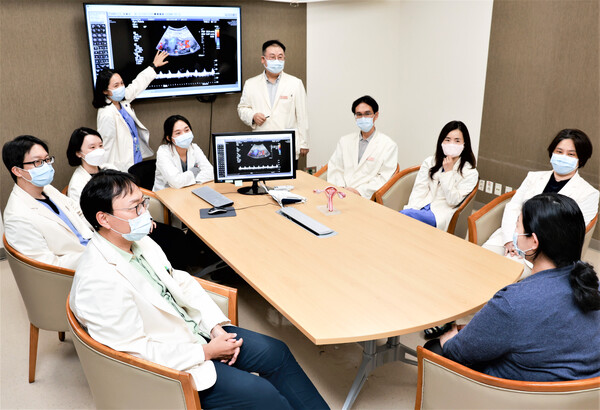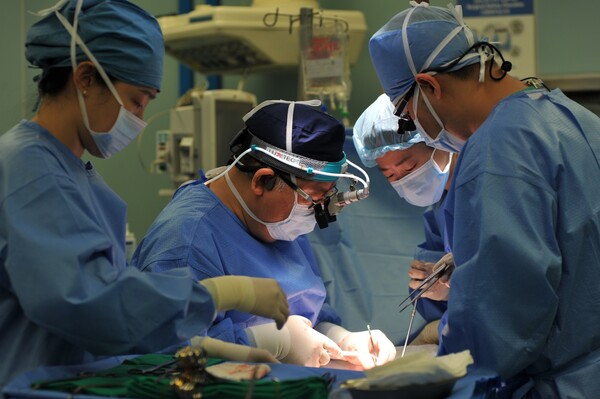Samsung Medical Center (SMC) said it has achieved a groundbreaking milestone by completing the first uterus transplant in Korea.
Conducted by a multidisciplinary team, the uterus transplant involved transferring the uterus of a brain-dead woman to a 35-year-old recipient diagnosed with Mayer-Rokitansky-Küster-Hauser (MRKH) syndrome.
Remarkably, the transplant has proven stable for 10 months, showing no signs of rejection, as of Friday.
MRKH syndrome, a congenital condition characterized by the absence or underdevelopment of the uterus and vagina, impacts approximately one in every 5,000 women. Often discovered incidentally during medical examinations prompted by the absence of menstruation in adolescence, the syndrome presents unique challenges.
Despite the absence of a uterus, ovarian function remains normal in MRKH syndrome, allowing for hormonal balance and the possibility of ovulation. Theoretically, a uterus transplant opens the door to pregnancy and childbirth for individuals with this condition.
The patient who underwent the uterus transplant at SMC, also diagnosed with MRKH syndrome, sought medical assistance in 2021 to achieve pregnancy post-marriage.
The SMC’s multidisciplinary uterus transplantation team has been preparing for this groundbreaking procedure since 2019. Officially established the following year, the team comprised 15 professionals from diverse fields, including transplantation surgery, obstetrics and gynecology, plastic surgery, radiology, pathology, and infectious disease. A legal expert was also part of the team to address the legal aspects of the transplantation process.

Overcoming legal and financial hurdles
Given that this was the first uterus transplant in Korea, the team meticulously followed legal procedures, sought advice, and underwent reviews by the Ministry of Health and Welfare, ensuring procedural legitimacy through the Institutional Review Board (IRB) review.
However, the initial steps were challenging, given the financial constraints associated with introducing new surgical procedures within Korea's health insurance system. Fortunately, the team received support from individual donors, foundations, and the producers of the 2020 TV drama “Hospital Playlist.”
The donation from the producers of “Hospital Playlist” was particularly significant because they had known SMC Gynecology & Obstetrics Professor Oh Soo-young, a member of the uterus transplantation team. Oh was a source of inspiration for the main character “Chae Song-hwa” in the drama.
Overcoming initial setbacks, including the removal of the transplanted uterus after two weeks due to poor blood flow in July last year, the team successfully conducted a second uterus transplant in January.
The patient experienced her first menstrual period 29 days post-transplant and has maintained a regular menstrual cycle since then.
Biopsies at various intervals post-transplant, including 2/4/6 weeks, 4 months, and 6 months, revealed no signs of rejection, indicating the complete integration of the transplanted uterus into the patient's body.
Towards parenthood: SMC's vision for future of uterus transplants
Looking ahead, the focus is on achieving pregnancy. Professors Lee Dong-yun and Kim Sung-eun of the Department of Obstetrics and Gynecology are working on inducing implantation in the transplanted uterus using embryos created from the patient's harvested eggs and her husband's sperm.
Uterine transplantation has a history dating back to 2000 in Saudi Arabia, with subsequent success reported in Sweden in 2014.
Recent advancements and accumulating evidence showcase increasing success rates in uterus transplants globally.
In the U.S. in 2021, Baylor University Medical Center reported 14 successful uterus transplants out of 20 attempts between 2016 and 2019, with 11 resulting in successful births, according to SMC.
At the International Congress of Uterine Transplantation's international congress in the U.S. in September last year, 109 successful cases including that of SMC were presented.

Park Jae-berm, a professor of transplantation surgery at SMC, is set to announce the success of the uterus transplant at the Asian Transplantation Week 2023 during the Korean Society for Transplantation's autumn international conference on Friday.
"Given that this marks the first uterine transplantation case in Korea, we approached each step of the process with the utmost caution, fostering a mindset geared towards forging a novel path in collaboration with the patient,” Professor Park said.
“Experiencing the initial setback was indeed disheartening, yet, in unison with the patient, we persevered and successfully navigated through the challenges, ultimately taking the pivotal first step towards realizing her dream of welcoming a baby.”

